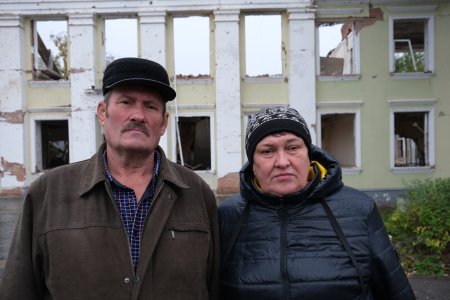Kateryna Hurina is a student of the Kharkiv National University of Radio Electronics who was almost killed by Russian missiles after being evacuated to Liubotyn. When Kateryna was in Germany, her apartment on Northern Saltivka burned down after a rocket hit the house.
My name is Kateryna; I am 21 years old and a student. Until 24 February, I studied a lot, finished my bachelor’s degree, and worked as a graphic designer in a real estate agency. I lived almost all my life in Northern Saltivka [the largest residential area of Kharkiv] with my mother, father, and a tiny Chihuahua dog. We have a friendly family, and I love our neighborhood. There were always many families with children and dogs on the streets. I liked living far from the center as if our small town was in the middle of a big city.
What was the beginning of a full-scale invasion for you?
Walking home on the 23rd, I wanted to look at the sky. So I just sat down and watched the stars for ten minutes. For some reason, I imagined I would not see this for a long time, and as it happened, I didn’t.
If you stand near my entrance, you can see the highway leading to the exit from the city. I took a picture of it and wrote to a friend: “When the war starts, I will see the tanks and send you a message, so you have time to pack.” That night I dreamed of a war, and in the morning, I woke up in a war.
All the cars honked and flashed their headlights, and explosions were heard. I went to the kitchen and saw my parents looking out the window. It reminded me of the scene from the Chernobyl TV series when people stood on the bridge and looked at the flaming reactor. We didn’t know what to do.
Where and how did you hide? How did your neighbors hide?
We decided that the safest hiding place was the bathtub in our apartment because it was between four walls. Most of the neighbors hid in the basement, but it was freezing there and not equipped as a bomb shelter. Also, there was little space, and people had to stand, so many got sick.
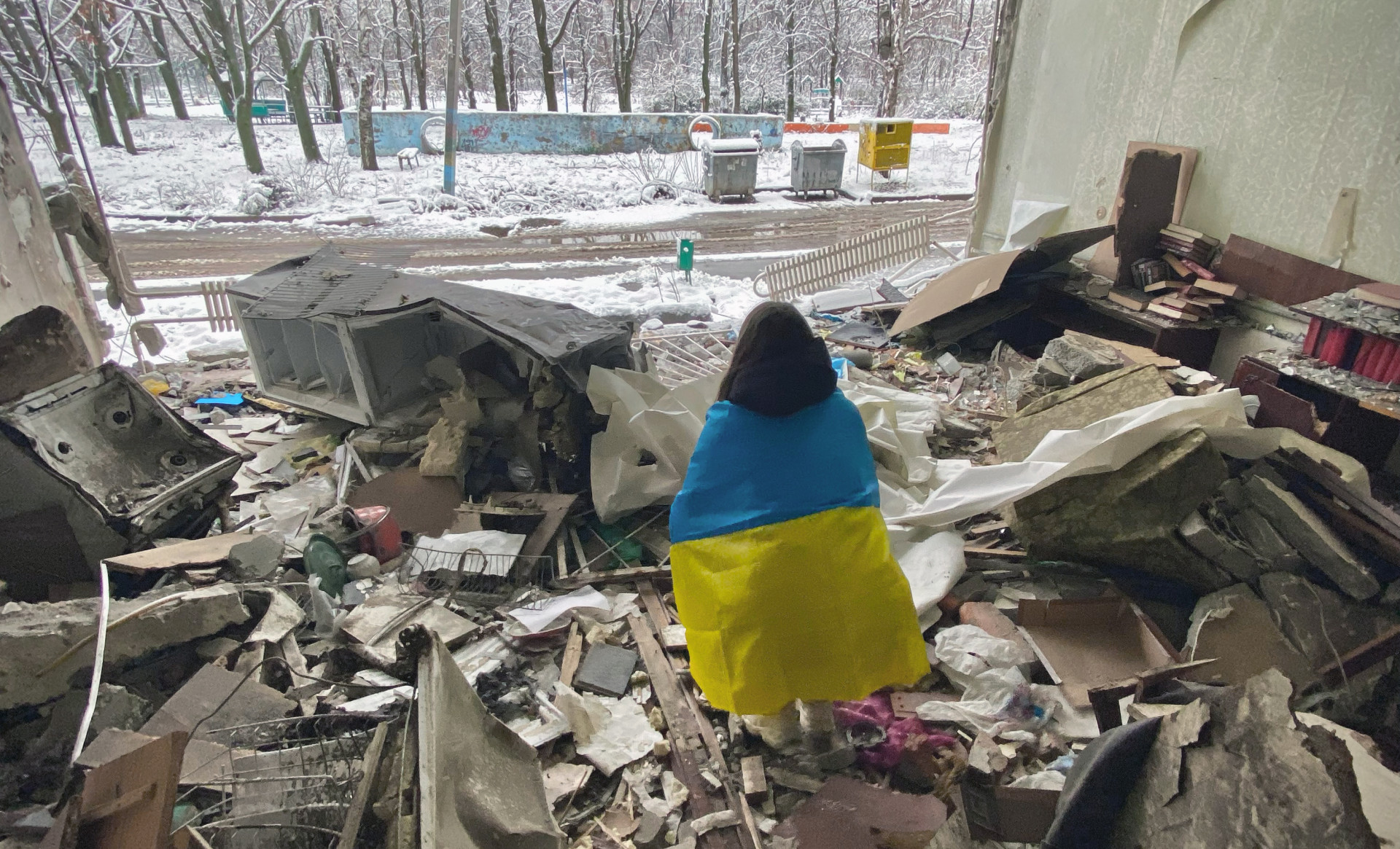
Have you witnessed the destruction of civilian facilities?
On the second day of the full-scale invasion, the Russians got into the house of my classmate and the apartment of my father’s friend. Later they got into the high-rise building on our street. I remember how my parents went to the store on 1 March, and I stayed in the tub with the dog when I heard a loud explosion. The loudest I’ve ever heard. I sat on the floor and thought this was my life’s end. At that time, a friend called me with the words: “Katia, your building is on fire.” The shell hit the seventh or eighth floor above the next entrance. The people who lived in this apartment were in the basement. Dad said they threw away everything that burned, so the fire went no further. That day, we thought a lot about evacuation but did not dare. We felt it would not hit the second time, but it did.
“I sat on the floor and thought this was my life’s end. At that time, a friend called me with the words: ‘Katia, your house is on fire.’”
On 4 March, Russian artillery shelled our area mercilessly. My mother works at “Silpo” on the Heroes of Labor street. When the shell flew there, she was behind the cash register. Mom said the shell killed a man who was standing nearby. He was crushed, and she hid under the table. That day, she had to sit next to the corpse and wait for the shelling to end. When she ran home, the houses were on fire, the wires were torn, and corpses lay on the street. Mom was shocked and scared and categorically said we would not stay.
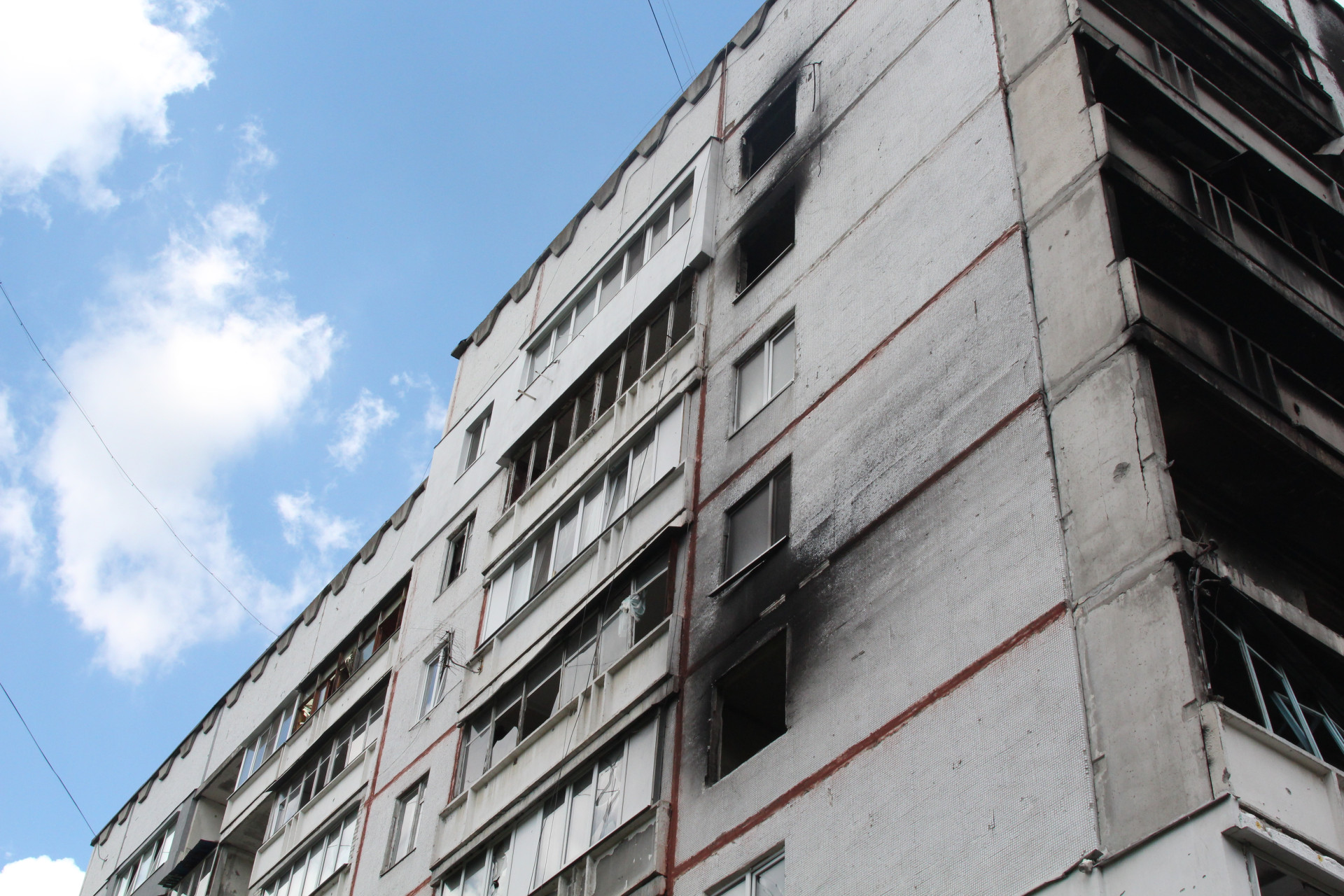
How did you leave Northern Saltivka? Did you feel safe after that?
We didn’t have a car, and walking was dangerous. We called the uncle, who had a car, but it turned out that there was no gasoline. Then uncle went to the grandfather, who gave us the rest of the gas from the generator, with which he lit the house, and dad also borrowed gasoline from neighbors. We collected it drop by drop for evacuation from Northern Saltivka. We went to my grandparents, they live in the city of Liubotyn, in the Kharkiv region.
“I was screaming, trying to wake up my family, and there was a powerful explosion at that moment.”
I was happy we got out of the shelling, but the feeling of security was short-lived. On the evening of 9 March, when everyone was sleeping, I heard the sound of aviation, took the dog in my arms, and ran into the corridor. I was screaming, trying to wake up my family, and there was a powerful explosion at that moment. Everything shook, and the windows flew out. I was terrified because my relatives ran into the corridor two minutes later. It turned out that the sound of broken windows awakened them. When dad came out to check what happened, he saw two shells in the yard, a meter from the wall where I was at the time of the explosion. My friends joke that I was born with a silver spoon. But after that, I had a very depressed emotional state. I had terrible dreams, and it seemed that something was always flying at our house. It was because I had already seen that this could happen. Then, my parents advised me to go abroad while they remained in Liubotyn.
What happened to your building?
The Russians continued to bomb our area, inflicting more and more hits on my house. They counted about twenty-one by now. One happened on the night of the ninth to the tenth of April when a rocket destroyed our apartment. On the morning of 10 April, when I was already abroad, my mother sent me a video with the words: “That’s it, Katia, we no longer have an apartment.” A passerby filmed my house. I called my mother, and she was crying. Dad went there: inside, almost everything was destroyed. The neighbors worried the house would collapse because the apartment was on the first floor. But it is still standing.
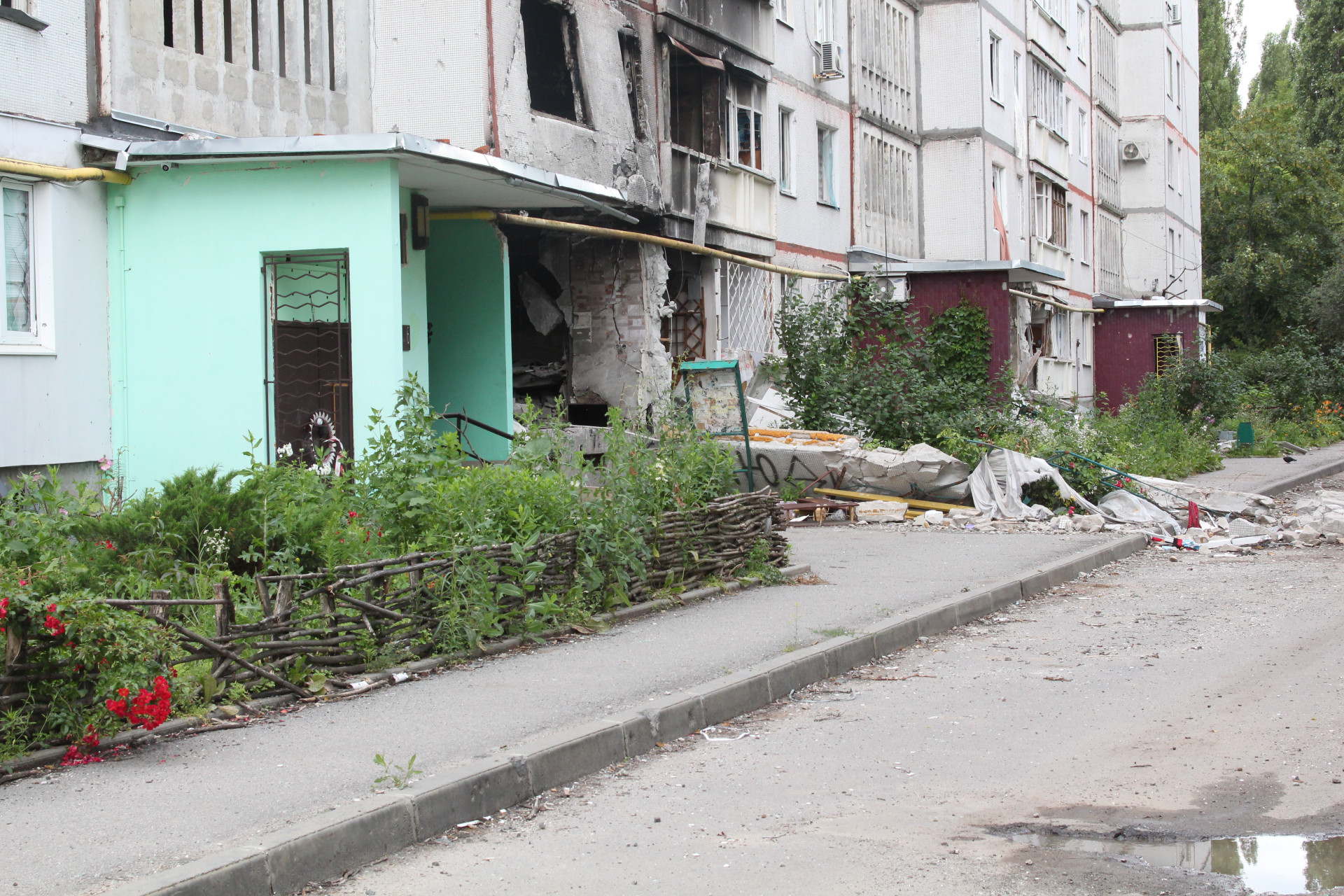
“Mom sent me a video saying, ‘That’s it, Katia, we don’t have an apartment anymore.’”
Has your attitude towards Russians changed?
Yes, it has. I was thirteen years old when the war began in the East of Ukraine and the occupation of Crimea happened. Then I thought that Putin was to blame and there were normal people among Russians. I even had three friends from there. However, when the rockets flew into my house on 1 March, they did not write anything, although they saw posts about it on social networks.
Then I realized that there are no good Russians. All of them are responsible. Unfortunately, it took a rocket to destroy my house to come to this understanding.
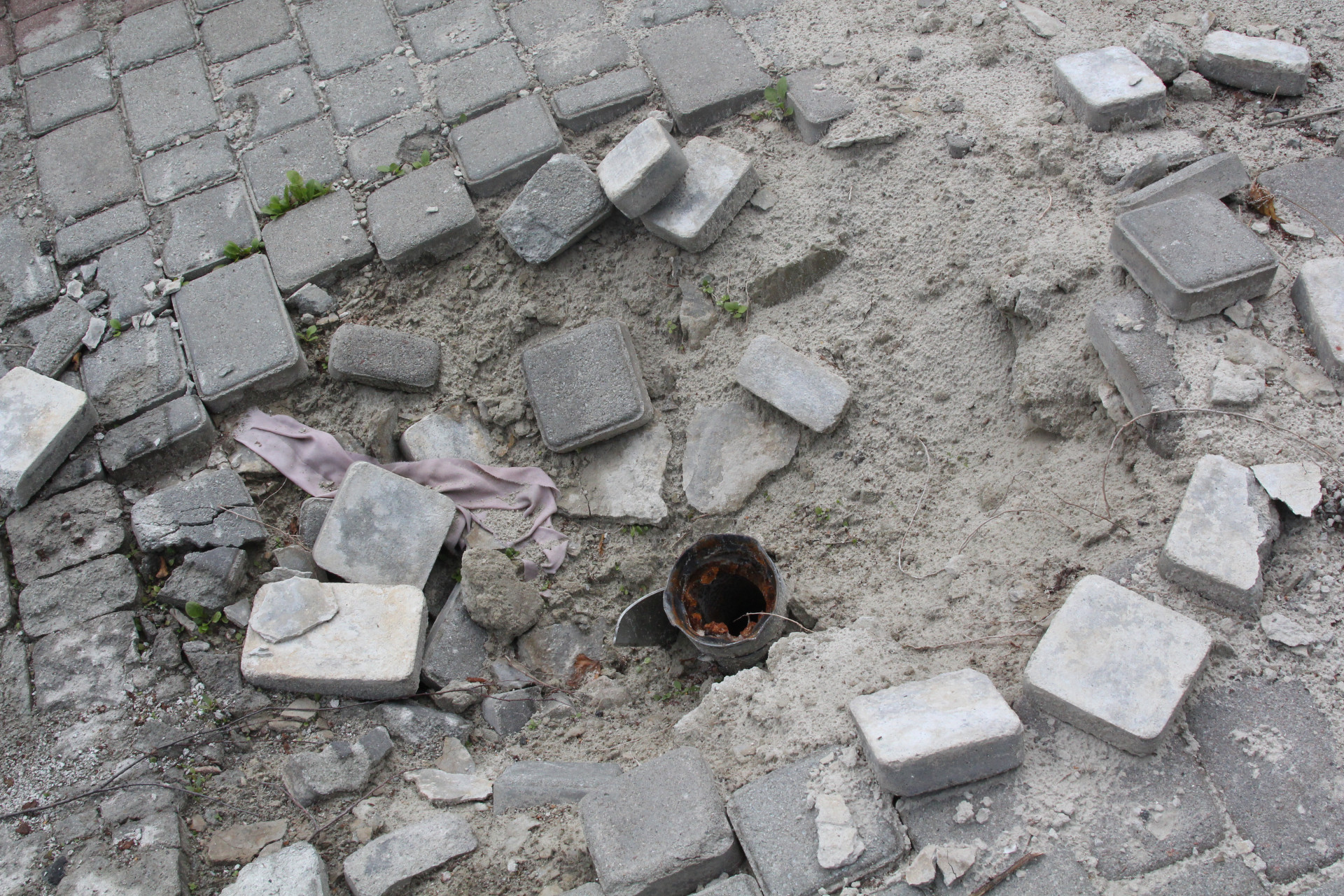
What are you planning to do next?
If I had been asked at the beginning of November, I would not have been able to answer. But everything changed because, at the end of November, I had a surprise for my parents: I came home to visit my friends. I was happier during that week in Ukraine than during a year abroad. Then I realized that I wanted to return. I plan to finish my tasks here, return to Kharkiv in May and start looking for a job. I want to shoot videos and write about the war for people abroad to see. Being here [in Germany], I realized how slow or incomplete information comes here. Therefore, I feel that I must speak.



